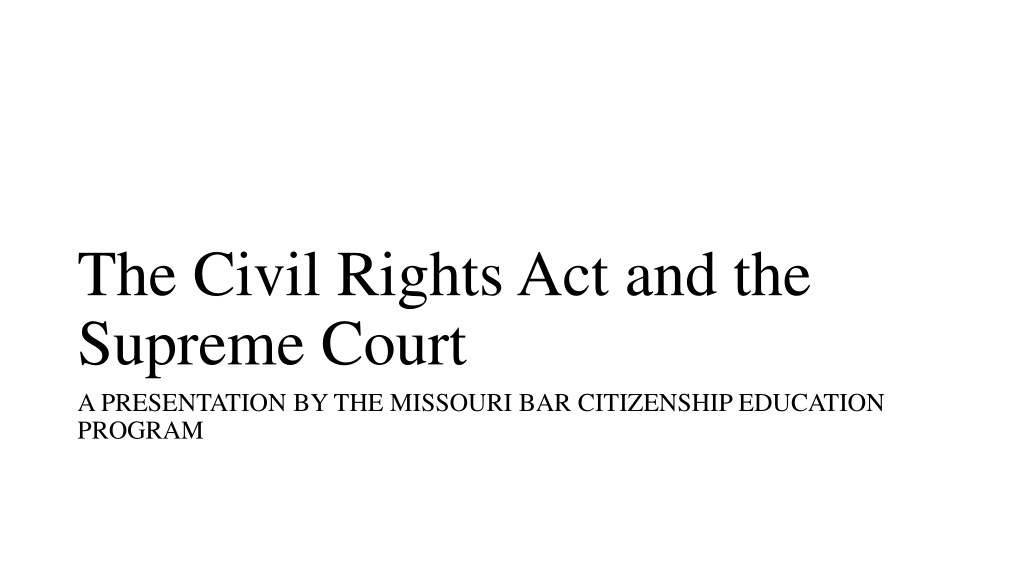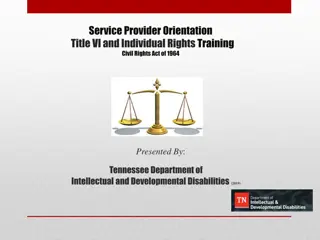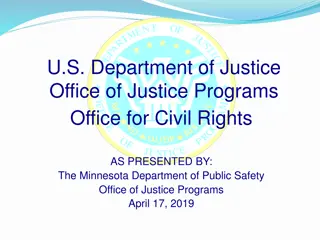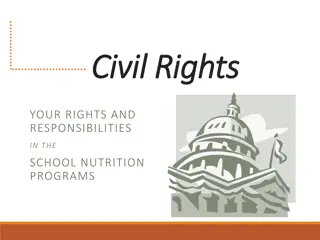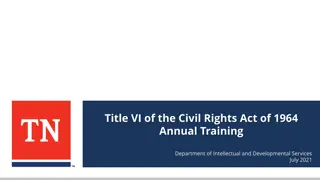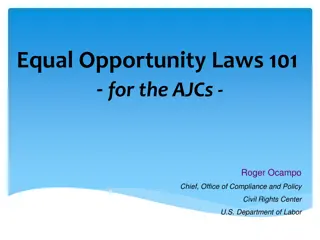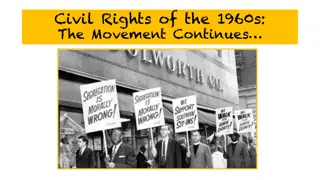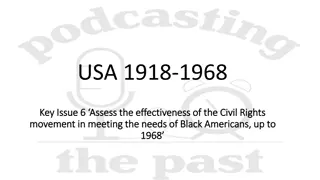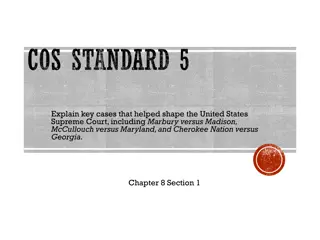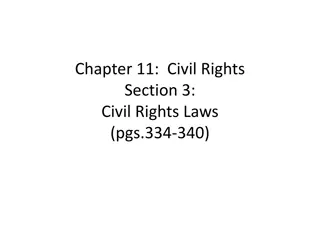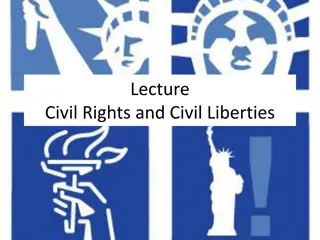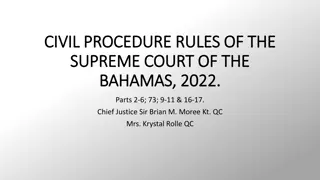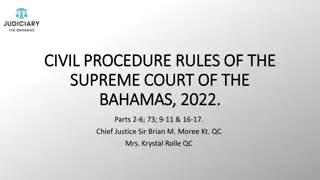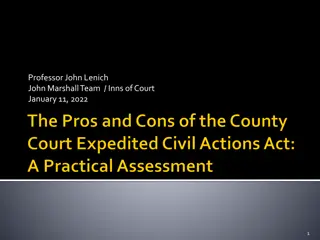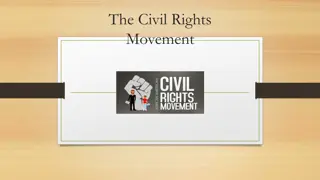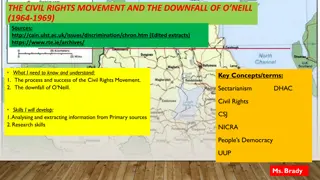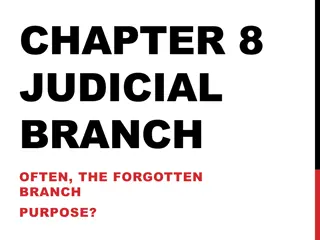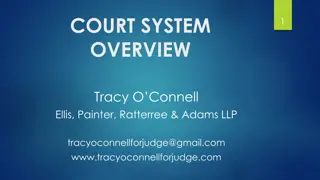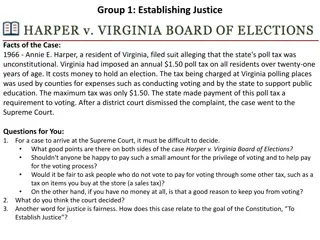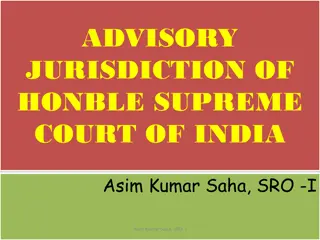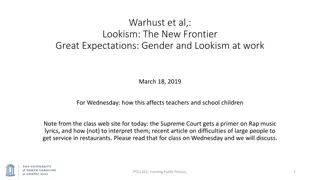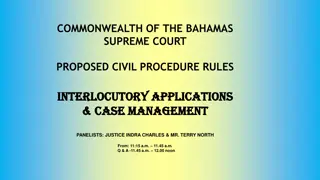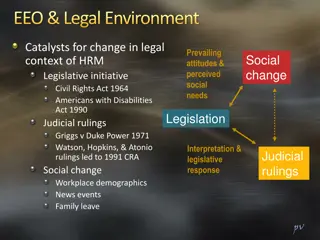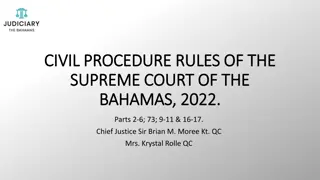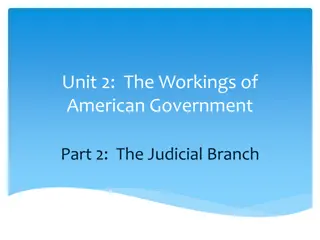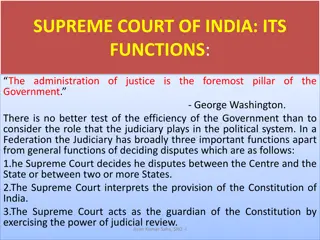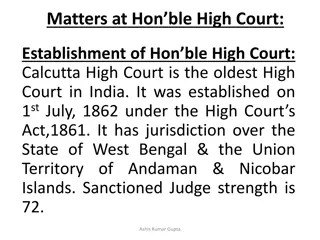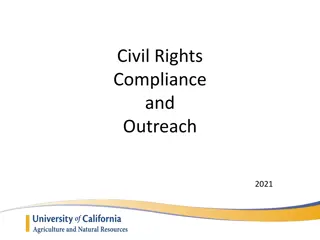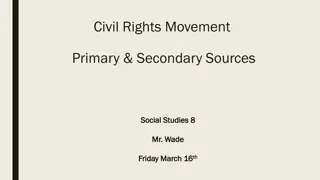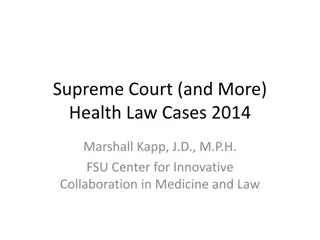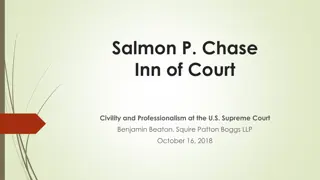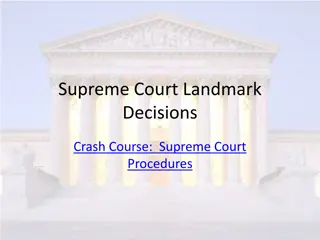The Civil Rights Act of 1964 and the Supreme Court
In the 1960s, Congress passed the Civil Rights Act of 1964, a pivotal legislation that prohibited discrimination in public accommodations. This act represented a significant shift in focus towards minority rights. The Supreme Court's past rulings on the Civil Rights Act of 1875 influenced Congress to base the 1964 Act on regulating interstate commerce to protect civil rights. The act faced a challenge from a motel owner in Atlanta, Georgia, leading to a legal battle over the scope of congressional power.
Download Presentation

Please find below an Image/Link to download the presentation.
The content on the website is provided AS IS for your information and personal use only. It may not be sold, licensed, or shared on other websites without obtaining consent from the author. Download presentation by click this link. If you encounter any issues during the download, it is possible that the publisher has removed the file from their server.
E N D
Presentation Transcript
The Civil Rights Act and the Supreme Court A PRESENTATION BY THE MISSOURI BAR CITIZENSHIP EDUCATION PROGRAM
For many years, Congress turned a blind eye to plight of minorities. Finally in the 1960 s, Congress enacted a series of laws that represented a major change in congressional focus and black opportunity.
The first of these landmark pieces of legislation was the Civil Rights Act of 1964 which prohibited acts of discrimination by private hotels, theaters, restaurants and other public accommodations.
Recall that the Civil Rights Act of 1875, which attempted to prohibit the same kind of private discrimination based upon the congressional power to enforce the 14thAmendment s Equal Protection Clause, was ruled unconstitutional by the Supreme Court.
In The Civil Rights Cases (1883), the Court noted that the Equal Protection Clause limited only governmental actions that denied equal protection of the laws, not private actions. With the 1875 Act, Congress was attempting to control the actions of private actors and institutions, which exceeded its power under the 14thAmendment.
In 1964, Congress sought to avoid making the same mistake by relying upon a different part of the Constitution.
A new strategy to protect civil rights Congress did not prohibit discrimination in hotels and restaurants because this discrimination deprived customers of equal protection of the laws. Instead, Congress relied upon its constitutional power to regulate interstate commerce. In the 1964 Civil Rights Act, Congress outlawed only the discrimination that had an impact on interstate commerce.
Within hours of its passage the law was challenged by Moreton Rolleston, owner of The Heart of Atlanta Motel in Atlanta, Georgia. He contended that Congress was attempting to regulate businesses that were local in nature and not involved in interstate commerce.
The Supreme Court upheld the constitutionality of the Civil Rights Act in Heart of Atlanta Motel v. United States (1964).
The Court recognized the power of Congress to regulate passengers traveling in interstate commerce and then identified the ways Heart of Atlanta was not just a local business:
It is readily accessible to interstate highways 75 and 85 and state highways 23 and 41. Appellant solicits patronage from outside the State of Georgia through various national advertising media, including magazines of national circulation; it accepts convention trade from outside Georgia and approximately 75% of its registered guests are from out of State.
The Court then addressed the impact on travelers of discriminatory practices of establishments like Heart of Atlanta Motel: the obvious impairment of the Negro traveler's pleasure and convenience that resulted when he continually was uncertain of finding lodging there was evidence that this uncertainty stemming from racial discrimination had the effect of discouraging travel on the part of a substantial portion of the Negro community
Finally, the Court addressed the argument that Congress was using its power to regulate interstate commerce to address a moral question:
That Congress was legislating against moral wrongs in many of these areas rendered its enactments no less valid. In framing Title II of this Act, Congress was also dealing with what it considered a moral problem. But that fact does not detract from the overwhelming evidence of the disruptive effect that racial discrimination has had on commercial intercourse
Congress was not restricted by the fact that the particular obstruction to interstate commerce with which it was dealing was also deemed a moral and social wrong.
The Court heard the case involving Heart of Atlanta Motel together with another case from the south. Ollie's Barbecue was a family-owned restaurant in Birmingham, Alabama, specializing in barbecued meats and homemade pies, with a seating capacity of 220 customers.
It was located on a state highway, 11 blocks from the interstate. Ollie s catered to a family and white-collar trade.
Blacks were not allowed in the dining room, having to rely on take- out service at the back.
In the 12 months preceding the passage of the Act, the restaurant purchased approximately 46% of its meat from outside of Alabama. Ollie McClung argued that the Civil Rights Act should not apply to his restaurant, given the small impact his business had on interstate commerce.
The Supreme Court in Katzenbach v. McClung (1964) considered the issue of whether the Civil Rights Act of 1964, as applied to a restaurant annually receiving about $70,000 worth of food through interstate commerce, is a valid exercise of the power of Congress.
The Supreme Court ruled that the Civil Rights Act did apply to establishments like Ollie s. In writing for the Court, Justice Tom Clark concluded that: Congress prohibited discrimination in those establishments having a close tie to interstate commerce and Ollie s is an example of such an establishment. The fact that Ollie s was serving food that has come from out of the State was a key factor in sufficiently linking it to interstate commerce. The applicability of the Civil Rights Act could be established either by what was seen in Heart of Atlanta, conducting business with customers traveling interstate, or as here, serving food which has moved in interstate commerce.
Finally, Clark conceded that Ollies Barbeque, in and of itself, did not have a controlling effect on interstate commerce. However, when the thousands of restaurants like Ollie s are considered, they will have a substantial effect on interstate commerce. Thus, Congress was well within its power to say that black people could not be discriminated against by Ollie McClung and those businessmen like him.
With the 1964 Civil Rights Act, Congress found a way around the limits placed by the decisions of the past and devised a creative solution to expand the civil rights of blacks. The Court upheld the action taken by Congress. Demonstrating just how important these cases were, the Court heard Heart of Atlanta and McClung in October and provided a decision in December.
Was justice done in 1964 by the branches of the federal government? Explain your answer.
